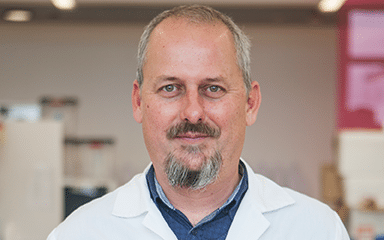Ovarian cancer is the second most commonly diagnosed gynaecological cancer in Australia, with an estimated 1,510 new cases of ovarian cancer in women in 2019. Ovarian cancer affects the ovaries and sometimes ovarian cancer cells travel in the bloodstream or lymphatic system to other parts of the pelvis, or to areas outside the pelvis such as the lungs or liver.
With a five year survival rate of less than 46% cancer of the ovary is the most prevalent, and lethal, form of gynaecological cancer.
There are three types of ovarian cancer, determined by the type of cell where the cancer first develops, these include:
- Epithelial tumours, which begin in the thin layer of tissue that covers the outside of the ovaries. About 90 per cent of ovarian cancers are epithelial tumours.
- Stromal tumours, which begin in the ovarian tissue that contains hormone-producing cells. These tumours are usually diagnosed at an earlier stage than other ovarian tumours. About 8 per cent of ovarian tumours are stromal.
- Germ cell tumours, which begin in the egg-producing cells. These rare ovarian cancers tend to occur in younger women.
Generally, it’s not possible to say what causes ovarian cancer in an individual woman. However, some known risk factors include:
- getting older: women who are over 50 are more likely to develop ovarian cancer than younger women;
- inheriting a faulty gene (called a gene mutation) that increases the risk of ovarian cancer; and
- having a strong family history of ovarian cancer, breast cancer, or some other cancers, including colorectal cancer and endometrial cancer.
Treatments include surgery, chemotherapy, radiotherapy and targeted therapy to specifically attack cancerous cells.
Treatment for ovarian cancer usually involves a combination of surgery and chemotherapy. Less often, treatment may include radiotherapy. Targeted therapy to specifically attack cancerous cells is another treatment option. The treatment plan will differ depending on the type and stage of the ovarian cancer, as well as their general health. A gynaecological oncologist will be best placed to manage your treatment plan, as they specialise in treating cancers of the reproductive tract and have the necessary surgical skills.


